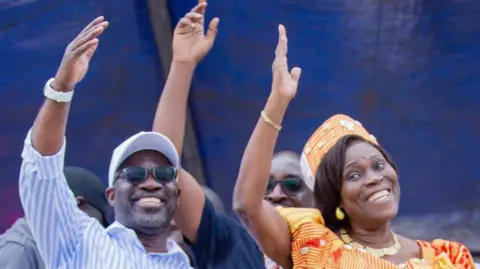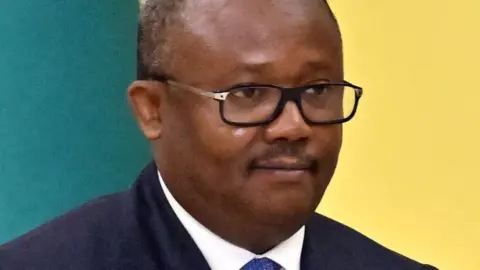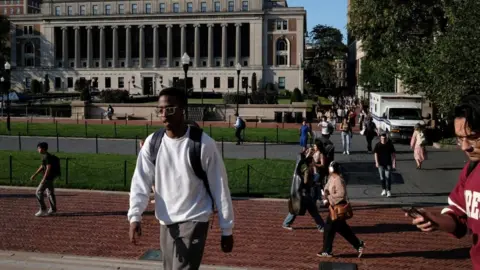Nicolas Negoce,BBC Africa, Abidjan and
Chiagozie Nwonwu,BBC Africa
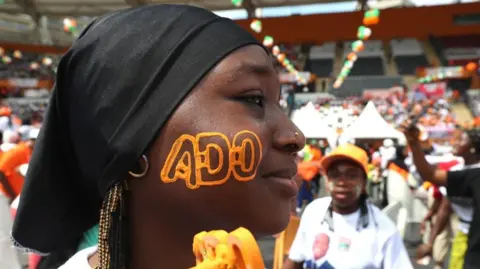 Reuters
ReutersDancing dominates campaign rallies in Ivory Coast but the pulsing energy and fervour belies concerns about the political landscape in the world’s largest cocoa producer.
Saturday’s presidential vote in the West African nation is as notable for the candidates who have been banned from running as for those who are vying for the top job.
While incumbent President Alassane Ouattara, a hero to some for bringing growth over the last 15 years to a country following a brutal civil war, is facing a backlash from those who see the 83-year-old’s fourth-term bid as a slap in the face to democracy – even though his candidacy is allowed by the constitution.
Prominent opposition leader Tidjane Thiam was disqualified in April after a court ruled that he had forfeited his Ivorian citizenship when he became French in 1987 – a ruling that he disputed – while former President Laurent Gbagbo was barred because of a 2018 criminal conviction.
It was Gbagbo’s refusal to accept defeat to Ouattara in a run-off vote in 2010 that sparked a post-election conflict that left more than 3,000 people dead and traumatised a nation vital to the global supply of chocolate.
Yet Ouattara, known to his supporters by his initials “Ado”, still faces strong competition, especially from Gbagbo’s former wife, and one of the country’s richest man, popular with urban voters – but it is a divided opposition.
There are four candidates up against the octogenarian:
- Simone Gbagbo, 76, former first lady, once married to ex-President Laurent Gbagbo and regarded as his main adviser
- Jean-Louis Billon, 60, a former minister and one of the country’s richest men who made his fortune from palm oil
- Henriette Lagou Adjoua, 66, a former minister and prominent women’s rights campaigner
- Ahoua Don Mello, 67, a former minister and ex-ally of ex-President Gbagbo.
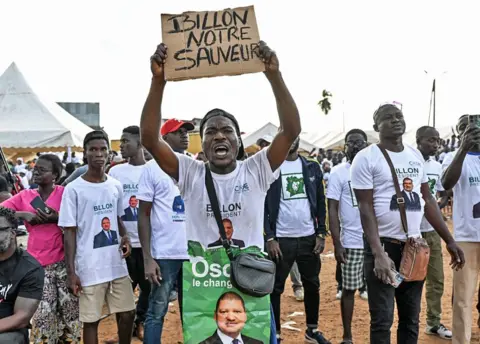 AFP/Getty Images
AFP/Getty ImagesDespite the economic progress under Ouattara, his opponents hope to capitalise on complaints from many of the country’s poor, who are not feeling the benefits of the rapid growth.
“The economy is growing, but not for us,” Billon, the business tycoon and youngest of all the candidates – representing the Democratic Congress (Code) – has said.
Dancing on stage during rallies in front of thousands of supporters in the political capital, Yamoussoukro, he has taken to doing judo moves to show he is “ready for the job and full of energy”.
“Young people can’t find jobs, and the cost of living is rising,” says the politician, who is confident that if he gets into a second-round run-off with the incumbent, then “Ouattara’s time will be over”.
Billon had been hoping to represent the centre-right Democratic Party (PDCI) of late President Henri Konan Bédié.
But in the end the party went for the now-disqualified Thiam – so without a candidate on the ballot paper, Billon feels sure he will get the backing of PDCI supporters.
However, Simone Gbagbo, leader of the leftist Movement of Capable Generations (MGC), has also positioned herself as a voice for the disaffected – and believes those votes will come to her.
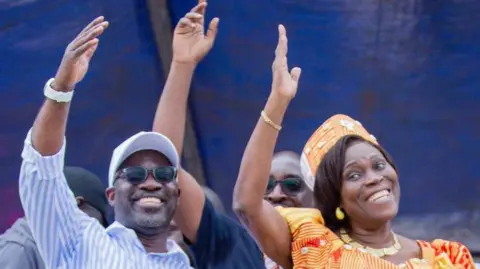 MGC
MGCAlways smiling and wearing traditional smart dresses, her energy sparks and she holds her mic like a pop star. A natural campaigner, she knows how to revitalise her supporters.
The former first lady, once dubbed “the iron lady” because of her reputation for toughness, is part of the CPA-CI, a coalition of opposition groups that came together earlier this year to protest against Ouattara’s candidacy.
“President Ouattara has done some good things, but he destroyed education,” she told her supporters recently.
With a background in education, academia and trade unions, her campaign has focused on rebuilding schools and offering better opportunities to young people.
Despite such criticism, Ouattara’s backers remain confident. His rallies seem a little bit less dynamic than in 2010, 2015 and 2020 – but they still attract many people of all ages.
The popular hit Coup du marteau (Hammer Blow) by Ivorian rapper Tam Paiya and featuring Team Paiya has become the unofficial anthem for his RHDP party with former prime ministers, ministers, MPs and other influential backers often seen dancing to it with energy.
“The president is in good shape and ready to serve again,” says government spokesman Adama Coulibaly, pointing to major public works and investor confidence as proof of the country’s stability.
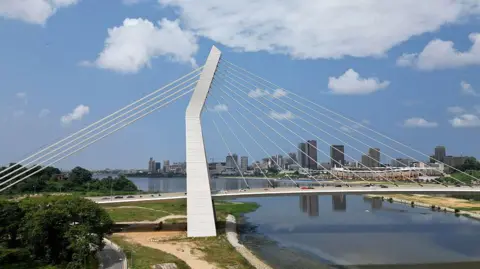 AFP/Getty Images
AFP/Getty ImagesBut despite the change to the constitution in 2016 that allowed Ouattara to run for a third and fourth term, his candidacy this time round has sparked anger and the government has reacted to recent protests with a swift crackdown.
More than 700 demonstrators were arrested earlier this month following an opposition march and 50 sentenced to three years in jail.
There is some concern that this could be the prelude to further disorder in the aftermath of the vote.
The memory of past political violence remains vivid – and to avoid any unrest, the security forces have been deployed across major cities.
Nevertheless many residents are taking precautions.
“We’re leaving Abidjan a week before the vote,” Ahoua Diomande, a mother of two, told the BBC.
“Each election brings fighting and deaths.”
But there are optimists too, like Charm Matuba, an Abidjan resident who originally hails from Congo-Brazzaville and has been closing following the campaign even though she cannot vote.
“I know everything will go well. Ivorians don’t want to die again for politicians,” she said.
“I just hope people will go to vote. All my friends support Simone. She’s a leader, a true source of inspiration. She can create the surprise.”
Regional loyalties are likely to play a large role in this election, as they have done in the past.
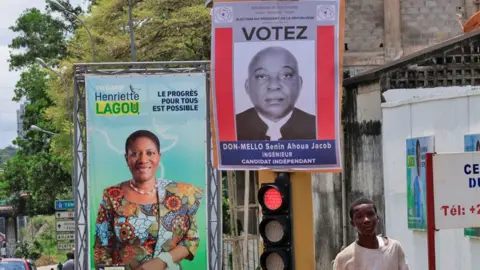 Reuters
ReutersOuattara enjoys strong support in the north, where his base among Dioula-speaking communities remains loyal – and he opted to launch his campaign in the west where he has previously picked up votes.
Simone Gbagbo also draws much of her backing from the west – and from the south-west too, historic strongholds of her ex-husband’s former party.
Billon appeals to urban voters and the central regions, promising to modernise the economy and foster generational change.
“He represents the young generation,” said Salifou Sanogo, who is 19. “It will be my first time voting and seriously, I know he will win. Ouattara is too old, tired and didn’t do anything for us. We need change, we need Billon.”
The endorsement of the excluded candidates would be significant but neither Thiam nor former President Gbagbo has backed anyone else.
However, Simone Gbagbo is supported by Charles Blé Goudé, once a close ally of her former husband and who has opted not to put his hat in the ring.
“Bring Simone to the palace,” the charismatic politician told thousands of his Young Patriot COJEP party supporters at one recent rally.
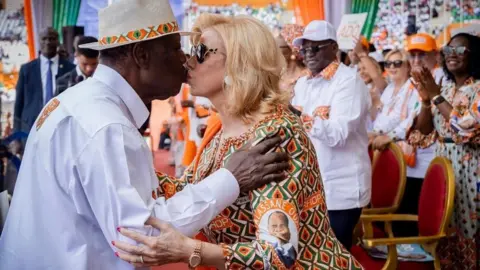 RHDP
RHDPAlong with the economy, foreign relations have also become a campaign issue.
Ivory Coast has taken a hard line against the military juntas in Mali, Niger and Burkina Faso, which now form the Alliance of Sahel States (AES) and have sought closer ties with Russia.
These regimes accuse Ouattara of siding with France, their former colonial power, and pursuing a “secret agenda” on its behalf – which his government denies, maintaining it supports democratic governance in the region.
But the rhetoric has sharpened tensions with its northern neighbours. Some opposition candidates, including Ahoua Don Mello, have suggested that Ivory Coast should be “open to new partnerships” with Russia and China, arguing that the country must diversify its alliances.
His message has resonated in parts of western Ivory Coast, where anti-French sentiment runs deep.
When fake news alleging that Ouattara had died trended on social media last march, the Ivorian authorities believe it started from the AES countries.
As the noise and excitement of campaigns draw to a close, President Ouattara’s supporters insist that continuity is the key to preserving stability and economic progress.
His critics argue that another term could deepen frustration and erode trust in democratic institutions – something that has dangerous echoes of the past.
More BBC stories on Ivory Coast:
 Getty Images/BBC
Getty Images/BBC